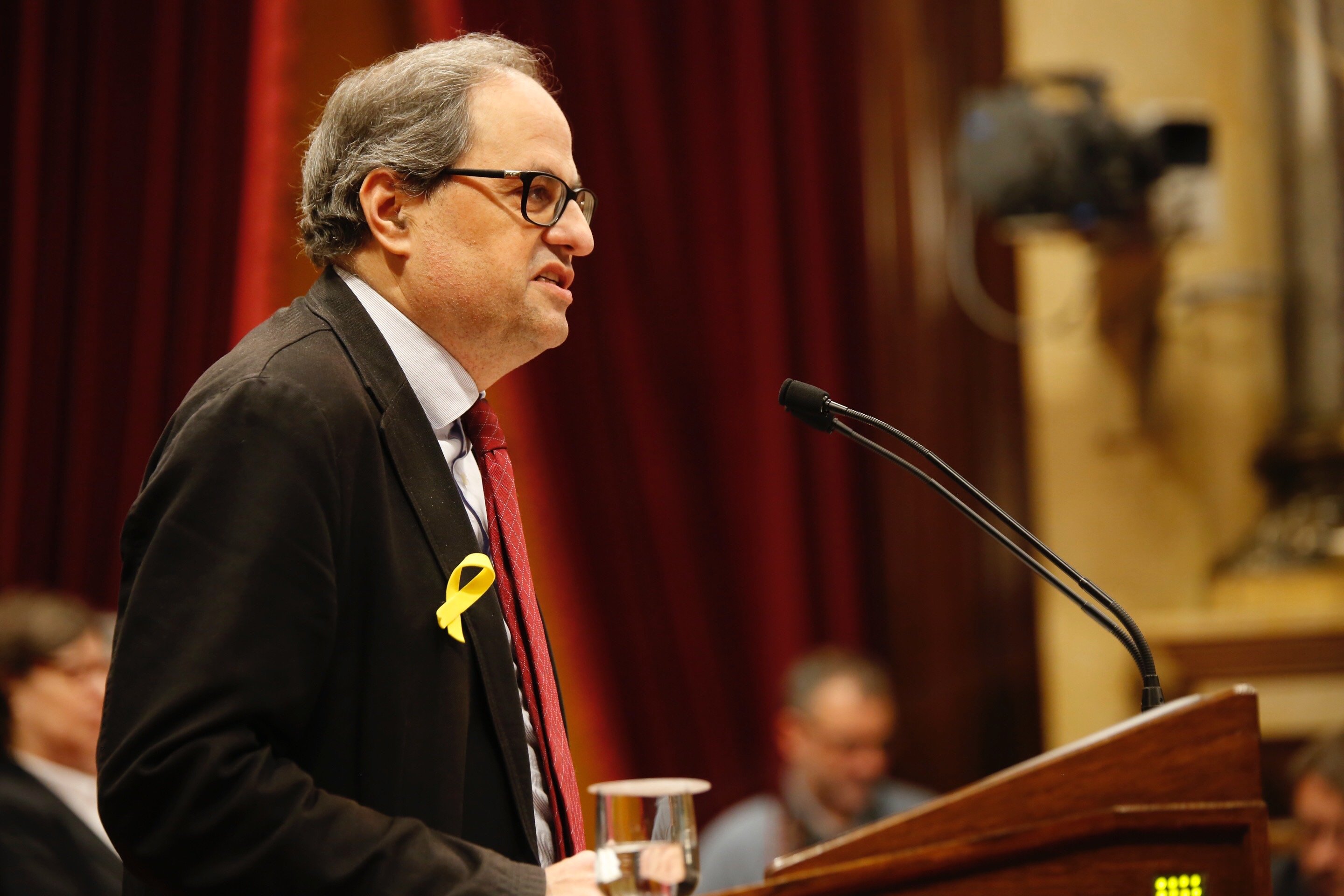Pro-independence party JxCat has its new candidate for investiture: Quim Torra. The deputy and former president of Òmnium Cultural is the name Carles Puigdemont's group will propose to be invested as the 131st president of Catalonia. The investiture debate will be held no later than Monday 14th May to clear the way to setting up a new government.
The decision over the fourth candidate, the so-called plan D, which has provoked intense speculation in recent weeks, was started by a meeting of JxCat's deputies last Saturday in Berlin. The proposal was finalised early this week in discussions between Carles Puigdemont and a small core of JxCat members, including Elsa Artadi, Albert Batet, the mayor of Girona, Marta Madrenas, and the Parliament's deputy speaker, Josep Costa.
The president immediately asked Torra to consider the proposal and gave him a few hours to come to a decision. The nomination was confirmed on Tuesday. Despite the intense speculation of journalists, which saw many names suggested, Torra was the first and only deputy Puigdemont asked, having asked for maximum discretion from all involved. Only this Thursday did he call the senior leadership of PDeCAT to Berlin to formally communicate his decision to his party, headed by Marta Pascal, which is part of JxCat.
Quim Torra, born in Blanes, a small town on the Costa Brava north of Barcelona, in 1962, has a degree in law from the Autonomous University of Barcelona, was director of Born Cultural Centre in Barcelona until 2015 and director of the Centre of Studies of Contemporary Topics of the Catalan government until last October. He has been a member of the leadership board of Òmnium Cultural and the permanent council of the Catalan National Assembly. He substituted the late Muriel Casals as interim president of Òmnium until the election of Jordi Cuixart.
Torra, who isn't a member of any political party (JxCat is a pro-independence, cross-spectrum election candidacy), has not hidden his reservations with certain of PDeCAT's positions, has had to assuage the doubts from some sectors of the party. On the other hand, he's considered a figure with a good relationship with left-wing pro-independence party CUP, after forming part of the team which negotiated the government manifesto in advance of an expected investiture.
The new proposal comes after it was confirmed impossible to find any way to use the new Catalan presidency law, voted on by the Parliament last Friday, intended to enable Carles Puigdemont to be invested from Berlin, or one of the imprisoned candidates. Once it was confirmed on Wednesday the Spanish government would appeal the new law, the president activated this plan D.
From here, once the imprisoned Jordi Sànchez renounces his candidacy, the Parliament's speaker, Roger Torrent, will call a round of talks with the chamber's groups to officially confirm Torra's nomination. Following that, he will convene the necessary debate and vote in the Parliament.
The expectation is that the first round vote, which requires an absolute majority to be successful, will be held next Monday, 14th May. Given CUP's announced intention to abstain on any candidate who is not Puigdemont, it should go to a second round. This would take place 48 hours later, in other words on Wednesday 16th, with the candidate only needing a simple majority to be invested president.
The debate could start before Monday 14th, but not later, because on the 16th the ministers in Brussels have a hearing in a Belgian court to be informed of the decision on the extradition warrants against them. If the warrant is refused, the bail conditions they are under will be lifted and they will regain their passports. As such, minister Toni Comín could lose the right to delegate his vote, as in theory he would face no restriction to attending the Parliament in person, even if he would be arrested automatically as soon as he set foot on Spanish territory to do so. That could endanger the simple majority needed for the vote to be successful in the second, and final round.
The decision to nominate Torra comes after JxCat decided in its meeting on Saturday in Berlin to make a last attempt to invest Puigdemont and, if this were to fail, to propose another name from their ranks to be able to invest someone. They have two weeks left on the countdown to successfully invest a president before the Parliament will be automatically dissolved and a new election will be called.
In that meeting, it was made clear that the new president will head a provisional government, as reported by El Nacional at the time. They will represent the president fired by the Spanish government under article 155 of the Constitution. At the same time as setting up the new executive in Catalonia, there will be set up a so-called Council of the Republic, a form of government in exile.
Quim Torra will be the fourth candidate proposed, following JxCat's attempts to invest Puigdemont, Jordi Sànchez and Jordi Turrull. Only in the case of Turull did it reach a debate in the chamber and a first-round vote, on 22nd March. The next day, however, he was sent into pretrial detention by Supreme Court judge Pablo Llarena. In the case of Puigdemont, the first debate on his candidacy was suspended by Torrent, the Parliament's speaker, just hours before it was to start on 30th January, to not break interim measures dictated by the Constitutional court. In the case of Sànchez, the debate was never even formally convened. Expected for the 13th April, it was cancelled given the judge's refusal to let him leave Soto del Real prison, near Madrid, under any form, even under guarded transport there and back, to take part in the debate.

